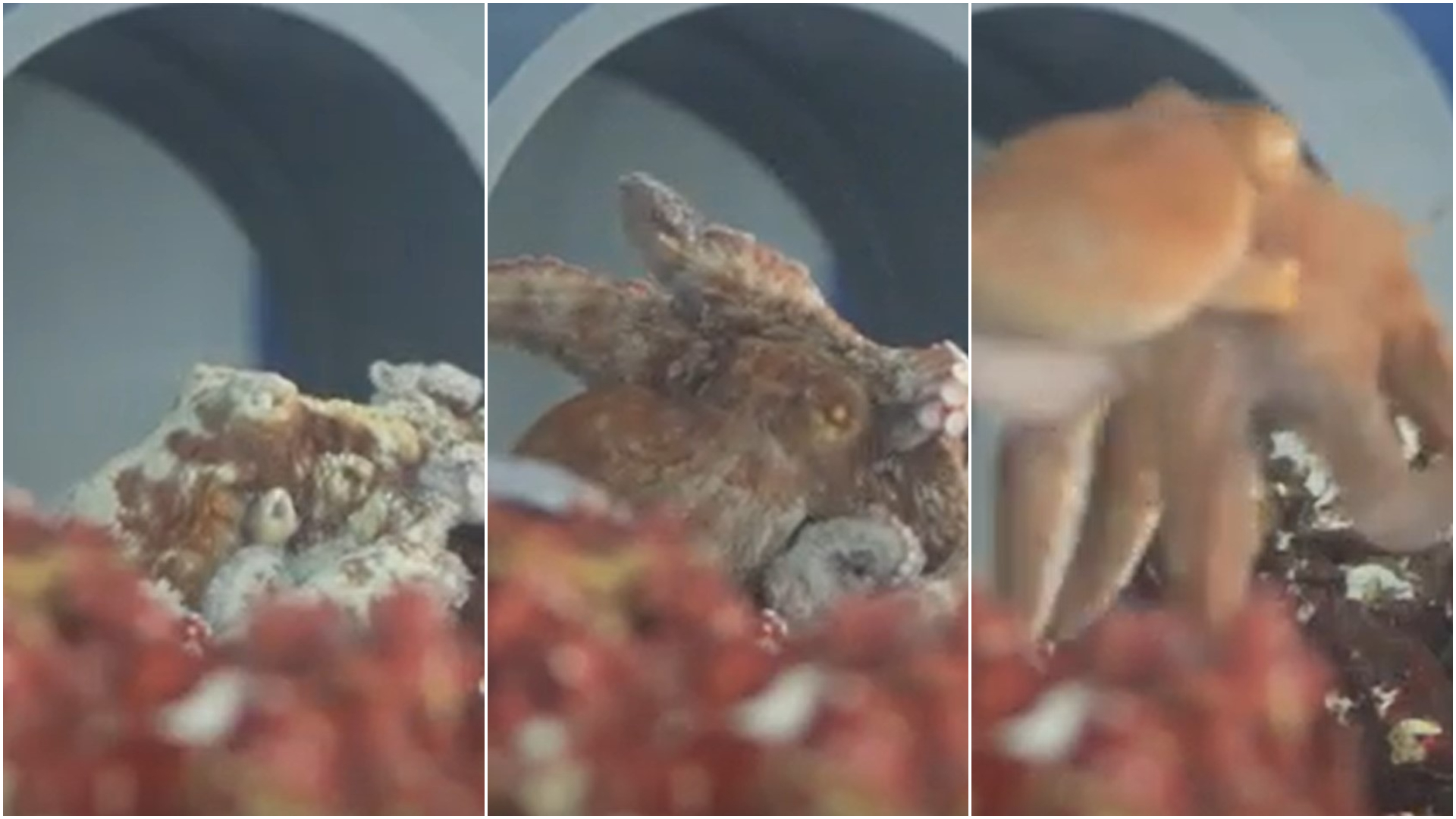
Scientists have filmed an octopus exhibiting strange behaviors in a laboratory in New York that could be explained by it having nightmares. Over the course of a month, researchers watched as the octopus appeared to jolt out of a restful sleep and thrash around, in a behavior that seemed almost like the animal was suffering from some kind of sleep disorder.
But was this octopus really having nightmares? There are some other potential explanations for why the animal might have acted this way, and experts expressed caution in interpreting the animal's behavior too quickly – but nonetheless, this behavior is certainly unusual.
"For all the studies that have been done" on octopuses and other cephalopods, "there’s still so much we don't know," said Eric Angel Ramos, a postdoctoral researcher at the University of Vermont who helped film the octopus.
Video footage from a laboratory at The Rockefeller University in New York captured four episodes in which an Octopus insularis named Costello appeared to sleep calmly in a tank before suddenly flailing its tentacles around in a frenzy. In two of these instances, Costello also shot a jet of black ink into the water, a common predator-defense mechanism.
Related: Octopuses torture and eat themselves after mating. Science finally knows why.
"It was really bizarre, because it looked like he was in pain; it looked like he might have been suffering, for a moment," Ramos told Live Science. "And then he just got up like nothing had happened, and he resumed his day as normal."
Some of these behaviors are similar to what an octopus might do when encountering a predator in the wild, according to the research team, who described these behaviors in a preprint (which has not been peer-reviewed) posted to the server bioRxiv this month.

That led the authors to speculate that “the animal may have been responding to a negative episodic memory or exhibiting a form of parasomnia,” meaning a sleep disorder. But they also cautioned that nothing can be definitively concluded from these observations.
Recently, researchers have learned more about octopus sleep. In 2021, scientists published a study documenting evidence of a two-stage sleep pattern in the animals, consisting of “active” and “quiet” sleep — similar to how humans fluctuate between rapid eye movement (REM) and non-REM sleep each night. In humans, most dreaming occurs during REM sleep, so some scientists have wondered if octopuses may also dream during their “active” sleep stage.
However, one expert who wasn’t involved in the observations expressed caution in interpreting the octopus's actions as dreams.
We don't know enough about the neuroscience of sleep in cephalopods to know if they dream at all, let alone have nightmares, Robyn Crook, a comparative neurobiologist at San Francisco State University, told Live Science. And even if octopuses do dream, they might dream in a completely different way than humans do, she said.
“It's not something that we could easily answer,” Crook said. “It's a very philosophical question.”
So although the behaviors in this video are "very interesting," they could very likely have been spurred by something other than dreams, she said.
For example, the octopus might have just been startled by something, Crook said. This octopus also might have been exhibiting signs of senescence, she said. This is the stage of an octopus’s life that occurs right before death, when their bodies start to break down.
In another octopus species, the giant Pacific octopus (Enteroctopus dofleini), Crook and her colleagues recently found an association between senescence and nervous system degradation. To her, the arm movements in the video seemed more like evidence of a lack of motor control, which she says is associated with senescence, rather than anti-predator behavior.
Indeed, the species Costello belongs to lives for about 12 to 18 months, Ramos said, and Costello died shortly after these incidents. "I don't exclude that senescence could be one of the drivers of this," he told Live Science.
It's possible that this behavior seemed unusual because many laboratory octopuses are euthanized before they start to senesce, Ramos said. Plus, most labs aren't filming their octopuses 24/7, he added, so other laboratories might have missed chances to spot similar behaviors.







